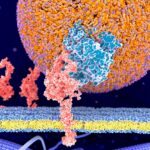
Like many, I waited with bated breath for results of the anti-PCSK9 (evolocumab) FOURIER cardiovascular outcome study last week. There have been many interesting commentaries written on the findings. A few of my favorites are listed here (Matthew Herper), here (David Grainger), here (Derek Lowe), and here (Larry Husten), amongst others, with summaries provided at the end of this blog. Most of these articles focused on clinical risk reduction vs. what was predicted for cardiovascular outcome, as well as whether payers will cover the cost of the drugs. These are incredibly important topics, and I won’t comment on them further here, other than to say that the debate is now about who should get the drug and how much it should cost.
In this blog, I want to emphasize key points that pertain to human genetics and drug discovery. And make no mistake: the anti-PCSK9 story and FOURIER clinical trial outcome is a triumph for genetics and drug discovery. This message seems to be getting muddled, however, given the current cost of evolocumab and the observation that cardiovascular risk reduction was less than expected, based on predictions from a 2005 study published by Cholesterol Treatment Trialists (CTT) (see Lancet study here).…
Read full article...

Yesterday I participated in the National Academy workshop, “Enabling Precision Medicine: The Role of Genetics in Clinical Drug Development” (link here). There were a number of great talks from leaders across academics, industry and government (agenda here).
I was struck, however, by a consistent theme: most think that “precision medicine” will improve delivery of approved therapies or those that are currently being developed, whether or not the therapies were developed originally with precision medicine explicitly in mind. Many assume that the observation that ~90% medicines are effective in only 30% to 50% is the result of biological differences in people across populations (see recent Forbes blog here). This hypothesis is very appealing, as there are many unique features to each of us.
An alternative explanation is that most medicines developed without precision medicine from the beginning only work in ~30% patients because the medicines don’t target the biological pathways that make each of us unique.
I believe the most likely application is in the discovery and development of new therapies. That is, I believe that the greatest impact will come when precision medicine strategies are incorporated into the very beginning of drug discovery, and will only rarely have an impact on therapies that were not developed with precision medicine in mind from the start.…
Read full article...

This week I want to focus on the role of biomarkers in drug discovery and development, which is one of the three pillars of a successful translational medicine program (see slide deck here). The focus is on Alzheimer’s disease, based on recent articles published in JAMA. At the end of the blog you will find postings for new biomarker positions in Merck’s Translational Medicine Department.
[Disclaimer: I am a Merck/MSD employee. The opinions I am expressing are my own and do not necessarily represent the position of my employer.]
Before I start, I want to point to a few blogs that provide counterarguments to some of the optimistic opinions expressed in this blog. The first is David Dobb’s negative view on big data (here); the second on Larry Husten’s concerns about conflicts of interest between academics and industry, as it relates to a recent NEJM series (here). I will not comment further, but it is worth pointing readers to these blogs and related blogs for a balanced view on complicated topics.
I have expressed the strong opinion that what ails drug discovery and development is that we pick the wrong targets, don’t develop robust biomarkers, and we don’t test therapeutic hypotheses quickly enough in clinical trials.…
Read full article...




